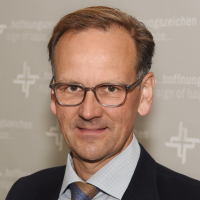In 2007, news reached Sign of Hope from the population in the southern Sudanese state of Unity that the water from the hand wells was making them sick. "The water tastes bitter", "If we drink the water, we get diarrhea in half an hour," and, "We don't even wash our clothes with it because it attacks colors and destroys fabrics," This is what was expressed. After several years of research trips with numerous sampling, Sign of Hope was able to scientifically prove that the oil industry in the north of South Sudan is contaminating the groundwater through the extraction and processing of petroleum.
Salts, chemicals and heavy metals make the water from the upper aquifer, from which conventional hand wells draw water, undrinkable for the population. This puts the health of at least 180,000 people in the vicinity of the Thar Jath oilfield at risk - for generations to come.
Taking Responsibility - Helping People
Proving that the contaminated water was linked to the oil industry's activities, however, was only the first step.
Closely intertwined with our human rights work, Sign of Hope carried out protest actions addressed to the oil industry and informed the public with media reports and press conferences (most recently in 2015 in Juba, the capital of South Sudan, where many South Sudanese media representatives were present). The focus of the efforts has been and continues to be on improving the living conditions of the people in the region. The goal: to move those responsible to action:
Not only the population, but also the flora and fauna of the area are affected by the consequences of oil extraction and processing. The oil facility is located in the Sudd, the largest swamp area in the world formed by the Nile River.
One sustainable way to provide clean water to people is to build deep wells that reach into a non-contaminated water reservoir. In recent years, Sign of Hope implemented six of these solar-powered drinking water wells, which are up to 300 meters deep. Unfortunately, some of them were also damaged by the fighting in the region. Thus, many people now have to resort to using water from the swamps again. Another frightening fact besides the contamination of the drinking water: Some of the 180,000 people have already suffered poisoning from drinking the water from the hand wells. Here, at the end of february, Sign of Hope, with the help of scientific hair sample analyses was able to prove that the consumption of the water contaminated by the oil industry is poisoning the people in the region around the oil plant, especially with lead. Lead attacks the nervous system, among other things. The population urgently needs medical help. Sign of Hope is working hard to find solutions.
Support our demands also on Twitter (@hz_soh).


 Donate now
Donate now





















